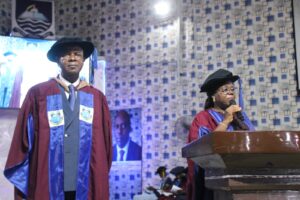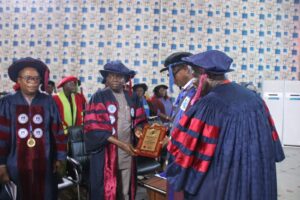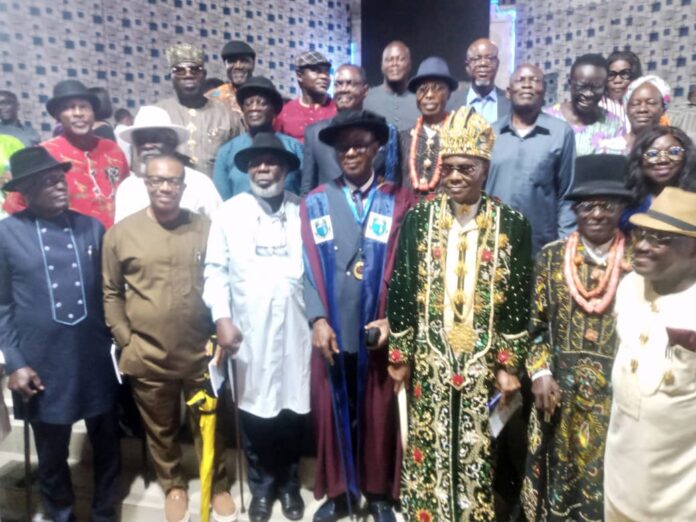In spite the vast and potential human and material resources that abound in Nigeria, the country continues to be weighed down by deliberate institutional mechanisms, policies, and corrupt practices that erode accountability, promote elite capture, and entrench a culture of underdevelopment.
These have been identified as “public administrative weapons of mass destruction,” which manifest in infrastructural decay, brain drain, rising inequality, youth unemployment, and a growing disillusionment with the state. The situation can only be reversed through a moral reawakening and civic responsibility, driven by value-based education, ethical leadership, and robust institutional reform aimed at restoring integrity and trust for a better country.

These were some of the postulates put forward by Professor Jacob Sunday Akikibofori while presenting the 70th Inaugural Lecture of the Ignatius Ajuru University of Education (IAUE) in Port Harcourt on Thursday, September 25, 2025 at the school’s auditorium.
Professor Akikibofori, whose lecture titled, “The Conscientious Individual And The Debased Social System: Unmasking Public Administration Weapons Of Mass Destruction In Nigeria”, noted that that public service in Nigeria has largely deviated from its core values of neutrality, efficiency, and responsiveness, to become an arena for personal aggrandizement and political patronage.
According to him, the weaponization of public administration in Nigeria is visible in the deliberate use of state institutions to stifle positive dissent, encourage examination malpractice, manipulate electoral outcomes, and protect political cronies, while regulatory bodies, anti-corruption agencies, and internal audit mechanisms are frequently captured by powerful interests and turned into instruments of vendetta or political control.
He noted that beyond leadership failure in Nigeria, “lies an ecosystem of impunity protected by law enforcement institutions, judicial compromise, and regulatory agencies that have lost their moral compass. These are hidden under the “weapons of mass destruction,” not in the traditional sense of nuclear or biological warfare, but as tools that destroy the human spirit, democratic accountability, and national aspirations.”

Akikibofori, who is a product of the University of Port Harcourt and a professor of Sociological Theory at IAUE further lamented that the public administrative sector which should serve as an engine of development and democratic consolidation has, “instead become a cesspool of maladministration, rent-seeking, and policy somersaults.
“From ghost workers in public payrolls to misappropriation of funds in constituency projects, from nepotism in civil service recruitment to politicised budgeting and procurement processes, the Nigerian administrative system presents a deeper rot that affects the very foundation of governance,” he stated.
Dissecting how corrupt practices, ranging from academic malpractices, symbolised by the the misuse of the “red pen”, ordinarily a neutral tool for marking scripts and assessing performance, becomes a tool for manipulation, rather than instruments of scholarly assessment, he said the consequences, “echo far beyond classrooms into the health sector, judiciary, infrastructure, and governance systems, producing leaders and administrators who perpetuate dysfunction rather than challenge it.”
To address the entrenched challenges of corruption, nepotism, and weak institutional frameworks, Professor Akikibofori recommended urgent holistic reform agenda anchored on integrity, transparency, and meritocracy that promotes the concept of the “Conscientious Individual.”
For him, the conscientious individual becomes the metaphor for ethical resistance, moral clarity, and a civic responsibility in the face of systemic decay. He becomes an individual whose actions are guided by a profound moral awareness and unwavering commitment to ethical principles, regardless of the social, political, and economic consequences.
He stated that rather than allow the conscientious Nigerian who insists on institutional integrity to be victimised by the instruments meant to uphold justice and threatened by a “debased elite,” that thrives on administrative dysfunction of survivalism, sycophants and systemic inertia, such individuals should be encouraged to become catalysts of national renewal.
“The conscientious individual, whether a student refusing to bribe, a lecturer grading fairly, a judge rejecting inducement, or a civil servant committed to transparency, represents the hope for a better Nigeria.
“Such individuals, empowered by knowledge and guided by conscience, can pierce through the fog of moral collapse and become catalysts of national renewal,” he noted.
Citing developed countries such as China, Germany, and South Korea where deliberate and strategic reforms to build resilient, transparent, and development-focused public systems worked, Prof. Akikibofori stated that those countries have proven that the ideal system is not a myth.
He described them as a product of intentional design, strong institutions, leadership commitment, and some cultural ethos that value transparency, merit, and accountability, noting that only a reformed public administration anchored on justice, equity, and conscience would be the foundation for a prosperous Nigeria.
For this to happen, Professor Akikibofori recommended that the education sector must undergo a comprehensive transformation to uproot academic malpractices and restore trust in the learning process, recruitment and promotion frameworks in public institutions should be built on standardised, verifiable and performance-based criteria, while strong legal enforcement and an independent judiciary, with robust mechanisms for prosecutingacts of impunity should be put in place.
Speaking at the end of the lecture which was well attended by academics from the institution and sister institutes in the state, community members of the lecturer, friends and associates, the Vice Chancellor of the institution, Professor Okechuku Onuchuku, commended the lecturer for the insights and recommendations and urged relevant agencies of government to note the recommendations.
Represented by the Director Academic Planning Professor Joseph Kinanee, the Vice Chancellor commended Prof Akikibofori for contributing immensely towards the growth of knowledge and being a vanguard for moral reawakening.
Represented by the Deputy Vice Chancellor (Academics), Professor Joseph Kinani, the Vice Chancellor commended Prof Akikibofori for contributing immensely towards the growth of knowledge and being a vanguard for moral reawakening.




